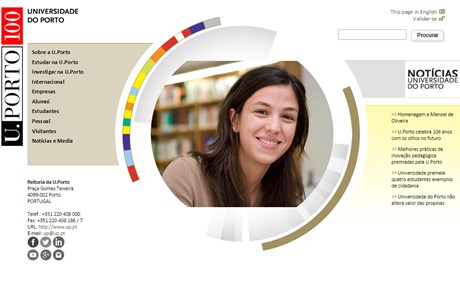University of Porto

University of Porto (UP) is a public research university located in Porto, Portugal.
The history of the University of Porto (UP) dates back to the 18th century, when it provided education in science, arts and humanities. It was officially founded as a university in 1911, as a result of reforms implemented by Passos Manuel, Minister of the Kingdom in the Government that came out of the Revolution of September. UP is heir to the Royal Navy and Commerce Academy of Porto, which was established in 1803 by Prince Regent John (future King John VI). The academy was founded to train naval officers and merchants, and it was one of the first institutions in Portugal to offer education in science and technology.
In the early 19th century, the academy was expanded to include a faculty of medicine and a faculty of law. In 1836, it was renamed the Polytechnic Academy of Porto. In 1869, the academy was further expanded to include a faculty of engineering. In 1911, the Polytechnic Academy of Porto was granted university status, and it became the University of Porto. The university's first rector was the mathematician Gomes Teixeira. In the early 20th century, UP experienced a period of rapid growth. New schools and faculties were established, and the university's enrollment increased significantly. UP also began to conduct research in a wide range of fields.
During the Second World War, UP played an important role in the Portuguese resistance movement. Many of the university's students and faculty were involved in anti-fascist activities. After the war, UP continued to grow and develop. In the 1960s and 1970s, the university expanded its campus and established new research centers. UP also began to offer new programs in a variety of fields, including engineering, science, medicine, and architecture. In the 1980s and 1990s, UP continued to develop its international reputation. The university began to attract students and faculty from all over the world. UP also established partnerships with other universities around the globe.
Today, UP is one of the leading universities in Portugal and internationally. It is a popular choice for students from all over the world, and its graduates are in high demand from employers. UP is committed to social responsibility and sustainable development. The university has a number of programs in place to support its students and the community, and it is working to reduce its environmental impact. UP is a proud and distinguished university with a long and rich history. It is a leading institution of higher education and research in Portugal and internationally.
Based on the QS World University Rankings of 2025, University of Porto is positioned as the #278 top university in the world, which makes it the #2 top university in Portugal. The university's global rank decreased by 25 points from last year.
University Profile
Get a quick snapshot of the university's key details.
| 2025 Ranking | #2 |
|---|---|
| University Name | University of Porto |
| Name in Local Language | Universidade do Porto |
| Acronym | UP |
| Year Established | 1911 |
| Motto | Ciência, Cultura, Progresso |
| Motto in English | Science, Culture, Progress |
| Governing Type | Public |
| Student Body | Co-education |
| Highest Degree | Doctorate |
| Campus Type | Urban |
Location
The university is located in Porto. Find the address and map of the university below.
| Address | Praça Gomes Teixeira, Porto, Portugal |
|---|---|
Contact
Connect with the university easily! Find their contact details.
| Phone | +351 (22) 040 8000 |
|---|---|
| Fax | +351 (22) 040 8186 |
| Website |

|
| Click here to send email | |
| More Links |
Admission Info
Admission to the University of Porto varies depending on the program and level of study. Generally, undergraduate applicants need to submit academic transcripts, proof of English or Portuguese proficiency, and may need to pass specific entrance exams. Graduate programs often require a bachelor's degree in a related field, letters of recommendation, and a research proposal for doctoral applicants. International students are encouraged to apply through the university’s dedicated international office for a seamless process.
| Accepts International Students | Yes |
|---|---|
| Admission Info | Click here |
Scholarship and Financial Aids
The University of Porto offers various scholarships and financial aid options to support both domestic and international students. These include merit-based scholarships for outstanding academic achievements, need-based assistance, and specific grants for international students to promote diversity. Additionally, the university participates in several European funding programs, such as Erasmus+, providing further financial support for eligible students.
Programs and Courses
Get a quick overview of programs and courses offered at this university.
| Bachelor's Degrees | Master's Degrees | Doctorate Degrees | Diplomas | |
|---|---|---|---|---|
| Arts & Humanities | n/a | |||
| Business & Social Sciences | n/a | |||
| Engineering | n/a | |||
| Language & Cultural Studies | n/a | |||
| Medicine & Health | n/a | |||
| Science & Technology | n/a |
Click on the following button to explore a detailed list of programs and courses of this institute.
View Course ListRanking History
The following chart shows how the ranking of this university in Portugal has changed over the last 5 years.
Report Incorrect Information